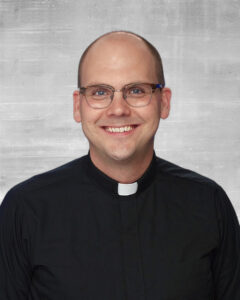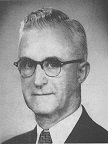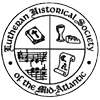Lutheran Historical Society announces A.R. Wentz Prize Winner
 The Lutheran Historical Society of the Mid-Atlantic announces that the Reverend Benjamin Schaefer is the winner of the 2020 A.R. Wentz Prize in American Lutheran History for his paper “Avoiding the Hornet’s Nest: Woman Suffrage and Synodical Conference Lutherans” in the award’s PH.D./M.A. category. Schaefer serves as the pastor at Mount Calvary Lutheran Church in Redding, California and shared that he was humbled and honored to receive the society’s Wentz Prize. Schaefer’s paper topic was timely for 2020 given the centennial anniversary of the passing of the 19th Amendment to the United States Constitution giving women the right to vote. Schaefer’s thesis indicated that “Biblical truth and cultural norms led most within the Synodical Conference to oppose the women’s suffrage movement and its goals for society and the church, while those same voices praised the abilities and contributions of women.” In addition, the society awarded honorable mention to Kristen Barnes, Alex Aakre, Christopher Royce and Matthew Borrasso for their papers.
The Lutheran Historical Society of the Mid-Atlantic announces that the Reverend Benjamin Schaefer is the winner of the 2020 A.R. Wentz Prize in American Lutheran History for his paper “Avoiding the Hornet’s Nest: Woman Suffrage and Synodical Conference Lutherans” in the award’s PH.D./M.A. category. Schaefer serves as the pastor at Mount Calvary Lutheran Church in Redding, California and shared that he was humbled and honored to receive the society’s Wentz Prize. Schaefer’s paper topic was timely for 2020 given the centennial anniversary of the passing of the 19th Amendment to the United States Constitution giving women the right to vote. Schaefer’s thesis indicated that “Biblical truth and cultural norms led most within the Synodical Conference to oppose the women’s suffrage movement and its goals for society and the church, while those same voices praised the abilities and contributions of women.” In addition, the society awarded honorable mention to Kristen Barnes, Alex Aakre, Christopher Royce and Matthew Borrasso for their papers.
 THE COMPETITION:
THE COMPETITION:
The Abdel Ross Wentz Prize for 2023 is a $2,500 cash award to be presented to the author of the most outstanding essay or research paper dealing with American Lutheran history. If merited, an award will be offered for a winning paper from each of the following categories: 1) first degree students enrolled at a seminary or divinity school 2) M.A./PH.D graduate students 3) Post graduate 4) Amateur Historian
QUALIFICATIONS:
To qualify for this competition, papers either may combine original research with interpretive analysis of any aspect of American Lutheran history, or they may provide an interpretive critique of published research or narrative history in the field. Congregational or other institutional studies will meet the requirement if they illumine broader trends within American Lutheranism. Submissions are to be history papers. Essays will be judged strictly on scholarly merit.
THE ESSAY AND DEADLINE
Papers should be 25- 35 double spaced, typed pages (article length). Papers should be submitted with footnotes and a bibliography citing primary and secondary sources. Papers should use either Kate Turabian’s A Manual for Writers or The Chicago Manual of Style. The author’s name, author’s institution (if applicable), the author’s degree program (if applicable), a mailing address, email address and a contact phone number should be on the cover sheet. In addition note the category for which the submission qualifies Identification of the author should only be on a cover sheet.
Deadline for submissions is September 30, 2023. Please submit an electronic copy to info@lutheranhistoricalsociety.com.
FOR MORE INFORMATION:
Download the Abdel Ross Wentz Prize Flyer 2023 or contact the society at info@lutheranhistoricalsociety.com
JUDGING THE ESSAYS
The Lutheran Historical Society of the Mid-Atlantic maintains a panel of judges, including recognized scholars in the field of American Lutheran history. The winner will be announced in late Fall and receive the cash award. Papers not winning the prize may receive honorable mention with an award. The society may withhold the prize in any year in which the judges deem no submitted essay worthy of the award.
GUIDELINES FOR WRITERS for the Wentz Prize: A Draft for consideration of the LHS, MA Board
Download Guidelines for Writers for the Wentz Prize
In general, judges of Wentz Prize papers expect submitted essays to be well written, follow scholarly methods and be original in content. While the following is a more detailed explanation of these expectations, they are not to be viewed as necessary or sufficient requirements for these papers.
Writing.
- Introduction. The paper should begin with commentary which both excites interest in the topic and provides a context for it. This context should include references to scholarly works informing the topic or, perchance, to the dearth of such works.
- Organization. The commentary should cover the topic logically, so that it is fairly comprehensive and moves toward a conclusion. A reader should understand the development of the topic. Good paragraphs, topic sentences and so forth generally accomplish this goal.
- Writing. The paper should follow proper grammar and syntax as these are generally understood.
- Conclusion. The end of the paper should be discernible as a conclusion, perhaps by summarizing the paper or suggesting what the paper “proves” or citing questions remaining about the topic that might be considered by other scholarship.
Scholarship.
- Sources. The paper should give evidence of examination of extant and current scholarly works (secondary books and articles), providing a context for the paper, and be based on primary sources (for some topics, what is ordinarily understood to be secondary work can be primary in nature.)
- Research methods. The paper should reference sources sufficient for the reader to know what sources are the bases of the paper and should follow the reference form commonly used by historians (not the MLA or APA formats), as these are detailed in guides such as Kate Turabian’s, A Manual for Writers of Research Papers, Theses and Dissertations, Latest Edition, Mary Ann Rampolla’s A Pocket guide to Writing History or the latest edition of the Chicago Manual of Style. The references can be presented as footnotes or end notes.
- The topic should be original in nature, though it may be an extension of a scholarly debate or an analysis of secondary works (which, in this case, would be understood to be primary sources).
- The paper should include a bibliography citing primary and secondary sources.
PREVIOUS YEAR’S WINNERS
The winning essays in previous years have been:
- 2020: “Avoiding the Hornet’s Nest: Woman Suffrage and Synodical Conference Lutherans” Reverend Benjamin Schaefer Press Release
- 2019: “The Church Grows under the Cross: Wisconsin Synod Mission Expansion into the Sunshine States in the 1950s” Reverend Joel Otto Press Release
- 2018: “Awakened to Confessional: The Doctrinal Development of F.C.D. Wyneken and its Place in the Course of Lutheranism in America.” Benjamin Phelps, Wisconsin Lutheran Seminary. Press Release
- 2016: “Herbjorn Gausta’s Good Shepherd (1895) at First Lutheran Church, Decorah, Iowa: Printed American Visual Culture as Painted Norwegian-American Propaganda.” by Hans Becklin, Lutheran School of Theology at Chicago (LSTC) Press Release
- 2013: “Lord, I Have Come into This Your House: A Brief History of the Norwegian Liturgy in America” by Kristofer Coffman, Luther Seminary, St. Paul, Minnesota
- 2013: “The Case of the Last American Missionary in China: The American Lutheran Response to the Imprisonment of Paul J. Mackensen, Jr. , 1952-1957” by Victoria Larson, Lutheran Theological Seminary at Gettysburg, Gettysburg, Pennsylvania
- 2011: “Henry Melchior Muhlenberg: A Biographical and Market-Historical Examination.” by Mark Dixon, Princeton Seminary, Princeton, New Jersey. Click here for press release in PDF format.
- 2010: “Hymns that Made Straight the Way to Bethlehem: A Lutheran Response to a Changing Lectionary” Philip Forness, Princeton Seminary, Princeton, New Jersey.
- 1997: “Standing at a Distance: Women in the Luther Theological Seminary and Pacific Lutheran Theolgoical Seminary Communities 1950-1970” by Kristina C. Weber, Pacific Lutheran Theological Seminary, Berkeley, California.
- 1996: “The Reverend Jehu Jones (1786-1852): First African American Lutheran Minister” by Earl K. Johnson, Jr., Lutheran Theological Seminary at Philadelphia.
- 1995: “The Transition in American Lutheran Theology: Verilius Ferm as a Paradigm of change,” by Bruce K. Lucus, Concordia Seminary, Fort Wayne.
- 1993: “From the Lutheran Hymnal to Lutheran Worship: a Paradigm of the Lutheran Church-Missouri Synod” by John M. Fuchs, Concordia Seminary, St. Louis.
- 1992: “Plain Speech: E. E. Ryden and the Merchants of Death” by Christian Scharen Batalden, Pacific Lutheran Theological Seminary.
The award is supported by Society’s Wentz Prize fund held by the Gettysburg Seminary. A committee of the Lutheran Historical Society administers the program (address: 61 Seminary Ridge, Gettysburg, PA 17325). The purpose of the Abdel Ross Wentz Prize is to foster and to encourage research and scholarly production in the field of American Lutheran history.
